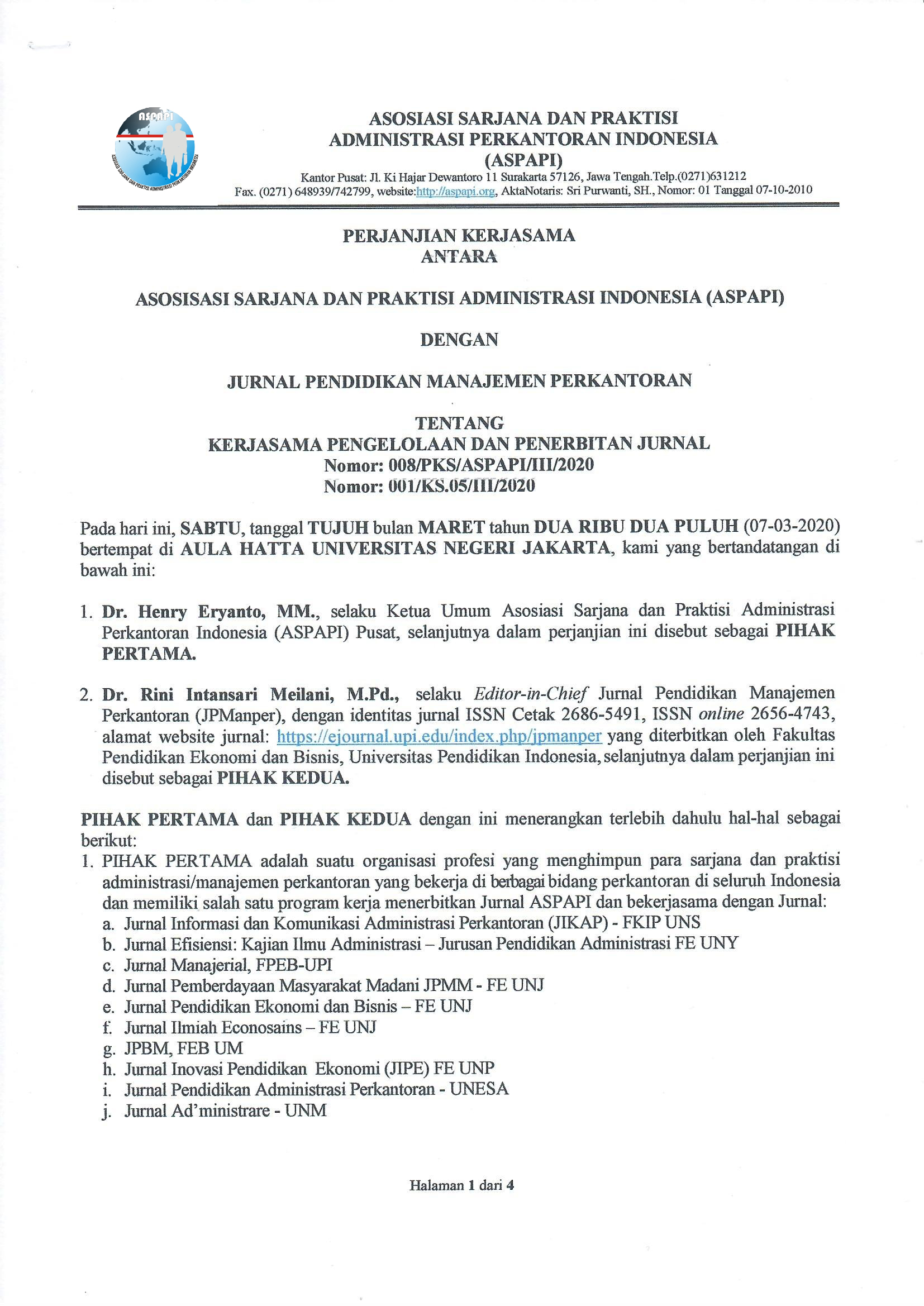Sistem Kompensasi dan Kepuasan Kerja Guru Tidak Tetap di Sebuah SMK Swasta di Indonesia
Abstract
In Indonesia, the existence of non-permanent teachers has become an inseparable part of achieving national education goals. However, a diverse and non-standard compensation system for non-permanent teachers in this country seems to have an impact on the types and amounts of compensation they receive. This triggers, in general, the high level of dissatisfaction in their work and the lack of optimal quality of their work as teachers. This article discusses the results of research aimed at knowing the effect of compensation systems for non-permanent teachers, of a private vocational high school in West Java, on their job satisfaction. Data was obtained through questionnaires distributed to 30 non-permanent teachers. Collected data were analyzed descriptively and inferentially. The results showed that the compensation system was in the category of being quite effective and the level of teacher jobsatisfaction was in low category. This shows that the compensation system has a positive and significant effect on non-permanent teachers’ job satisfaction. The effectiveness of the compensation system for non-permanent teachers, especially the type and amount of incentives, is the main focus that must be improved by schools’ authority and the government, along with the improvement of the quality of psychological aspects, especially in terms of creating an environment that supports non-permanent teachers to feel comfortable and be willing to continue working.
ABSTRAK
Di Indonesia, keberadaan guru tidak tetap telah menjadibagian yang tidak terpisahkan dalam pencapain tujuan pendidikan nasional. Namun demikian, sistem kompensasi yang beragam dan belum baku bagi para guru tidak tetap di negara ini nampaknya berimbas pada ketidaktetapan jenis serta jumlah kompensasi yang mereka terima. Hal ini memicu tingginya tingkat ketidakpuasan mereka dalam bekerja dan belum optimalnya kualitas kerja mereka sebagai guru. Artikel ini membahas hasil penelitian yang ditujukan untuk mengetahui pengaruh sistem kompensasi bagi para guru tidak tetap di sebuah SMK Swasta di Jawa Barat terhadap kepuasan kerja mereka. Data diperoleh melalui angket yang disebarkan kepada 30 orang guru tidak tetap. Data yang terkumpul dianalisis secara deskriptif dan inferensial. Hasil penelitian menunjukkan sistem kompensasi berada pada kategori cukup efektif dan tingkat kepuasan kerja guru tidak tetap berada pada kategori rendah. Hal ini menunjukkan bahwa sistem kompensasi berpengaruh positif dan signifikan terhadap kepuasan kerja guru tidak tetap. Efektivitas sistem kompensasi bagi guru tidak tetap, khususnya jenis dan besaran insentif menjadi fokus utama yang harus ditingkatkan kualitasnya oleh sekolah dan pemerintah, berikut dengan peningkatan kualitas aspek psikologis dalam hal penciptaan lingkungan yang mendukung para guru tidak tetap agar merasa nyaman dan betah untuk terus bekerja.
Keywords
Full Text:
PDFReferences
Adeoye, A. O. (2014). The Influence of Compensation Management on Employee ’ s Leadership Role in Insurance Sector : Nigeria Experience The Influence of Compensation Management on Employee ’ s Leadership Role in Insurance Sector : Nigeria Experience. Mediterranean Journal of Social Sciences, 5(27), 342–352. https://doi.org/10.5901/mjss.2014.v5n27p342
Al-nasser, A. (2016). The Effective Compensation System in Organizations. IOSR Journal of Business and Management, 18(11), 85–88. https://doi.org/10.9790/487X-1811048588
Bakotić, D. (2016). Relationship between Job Satisfaction and Organisational Performance. Economic Research-Ekonomska Istraživanja, 29(1), 118–130. https://doi.org/10.1080/1331677X.2016.1163946
Choudhary, S. (2016). Theoretical Perspective of Compensation Management in Organizations. International Journal of Multidisciplinary Research and Development, 3(10), 77–80.
Hajdukova, A., Klementova, J., & Klementova jr, J. (2015). The Job Satisfaction as a Regulator of the Working Behaviour. Procedia - Social and Behavioral Sciences, 190, 471–476. https://doi.org/10.1016/j.sbspro.2015.05.028
Inuwa, M. (2016). Job Satisfaction and Employee Performance: An Empirical Approach. The Millennium University Journal, 1(1), 90–103.
Kelechi, N. G., VO, A., TK, E., AA, A., AO, S., & AE, H. (2016). The Effect of Compensation Administration on Employee Productivity. Arabian Journal of Business and Management Review, 5(8), 40–47. https://doi.org/10.12816/0027245
Khan, M. S., Khan, I. U., Kundi, G. M., & Nawaz, A. (2014). The Impact of Job Satisfaction and Organizational Commitment on the Intention to Leave among the Academicians. International Journal of Academic Research in Business and Social Sciences, 4(2), 114–131. https://doi.org/10.6007/IJARBSS/v4-i2/610
Moorhead, G., & Griffin, R.W. (2013). Perilaku Organisasi:Manajemen Sumber Daya Manusia dan Organisasi, Edisi 9, Jakarta: Salemba Empat.
Msuya, O. W. (2016). Exploring Levels of Job Satisfaction Among Teachers in Public Secondary Schools in Tanzania. International Journal of Educational Administration and Policy Studies, 8(2), 9–16.
OO, O., AE, O., & OE, F. (2016). Empirical Appraisal of Compensation and Organizational Commitment in Education Management. Mediterranean Journal of Social Sciences, 7(3), 296–301. https://doi.org/10.5901/mjss.2016.v7n3p296
Raziq, A., & Maulabakhsh, R. (2015). The Impact of Working Environment on Job Satisfaction. Procedia Economics and Finance, 23, 717–725. https://doi.org/10.1016/S2212-5671(15)00524-9
Salisu, J. B., Chinyio, E., & Suresh, S. (2015). The Impact of Compensation on the Job Satisfaction of Public Sector Construction Workers of Jigawa State of Nigeria. The Business and Management Review, 6(4), 282–296.
Shooshtarian, Z., Ameli, F., & Aminilari, M. (2013). The Effect of Labor’s Emotional Intelligence on Their Job Satisfaction, Job Performance and Commitment. Iranian Jurnal of Management Studies (IJMS), 6(1), 29–45.
Silaban, N., & Syah, T. Y. R. (2018). The Influence of Compensation and Organizational Commitment on Employees ’ Turnover Intention. IOSR Journal of Business and Management, 20(3), 1–6. https://doi.org/10.9790/487X-2003010106
Szymendera, S. D. (2017). Workers ’ Compensation: Overview and Issues.
Weldeyohannes, G. (2016). Compensation Practice and Teachers Turnover Intention in Tigray. International Journal of Science and Research (IJSR), 5(9), 1372–1379.
You, S., Kim, A. Y., & Lim, S. A. (2015). Job Satisfaction Among Secondary Teachers in Korea: Effects of Teachers’ Sense of Efficacy and School Culture. Educational Management Administration & Leadership, 1–14. https://doi.org/10.1177/1741143215587311
Zubr, V., Sokolová, M., & Mohelská, H. (2016). The Influence of Selected Factors on Overall Job Satisfaction. Littera Scripta, 9(2), 169–184.
DOI: https://doi.org/10.17509/jpm.v4i2.18008
Refbacks
- There are currently no refbacks.
Copyright (c) 2019 Jurnal Pendidikan Manajemen Perkantoran
Jurnal Pendidikan Manajemen Perkantoran View My Stats



